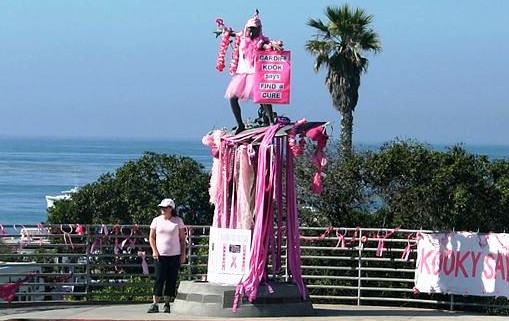Opinion
Help urged to fight breast cancer
 Breast cancer awareness display, San Diego
Breast cancer awareness display, San DiegoOctober is Breast Cancer Awareness Month, an important time to mark the significant strides made in the fight against breast cancer and to celebrate the lives of those women battling the disease. Increased awareness, education, and advancements in the detection and treatment of breast cancer mean more women are now living longer and fuller lives. However, Breast Cancer Awareness month also represents an important opportunity to look forward and consider the work that needs to be done.
One in eight women in the United States, or twelve percent of all women, will be diagnosed with breast cancer in their lifetime. More than 230,000 people this year will receive a diagnosis of invasive breast cancer in the United States. Approximately 40,000 women will die from the disease. In California alone, more than 200,000 women are currently living with breast cancer, and approximately 4,200 women will die of breast cancer this year.
Metastatic breast cancer is rarely cured. The five-year survival rate for those with metastatic breast cancer is 24 percent, according to the American Cancer Society. However, the disease is treatable, and oncologists work with their metastatic breast cancer patients to ensure as long a remission as possible with the highest possible quality of life.
Despite the general awareness that now exists around breast cancer, and despite the progress made in early diagnosis and treatment, one group of women battling breast cancer often goes underreported on, receiving less attention and fewer resources – those women battling metastatic or advanced breast cancer.
Metastatic or advanced breast cancer is the stage of cancer when cells have spread from the breast into other parts of the body, including the lungs, brain, bones, or liver. Although firm metastatic breast cancer statistics are not collected, approximately 5 percent of newly diagnosed breast cancer cases are diagnosed as metastatic, and it is estimated that 30 percent of early stage breast cancer cases will become metastatic or recurrent advanced cases.
Metastatic breast cancer is rarely cured. The five-year survival rate for those with metastatic breast cancer is 24 percent, according to the American Cancer Society. However, the disease is treatable, and oncologists work with their metastatic breast cancer patients to ensure as long a remission as possible with the highest possible quality of life.
Women diagnosed with metastatic disease – a disease likely to be terminal – often feel alone and isolated, even within the community of cancer patients. They often don’t see themselves or their reality reflected in the headlines and pink ribbons lovingly worn by so many at this time of the year when we celebrate the successful achievements in the treatment of breast cancer. Further, despite the morbidity and mortality associated with metastatic breast cancer, metastasis research receives a relatively small portion of overall cancer research spending.
We need more weapons in the battle against breast cancer, especially metastatic breast cancer. But as we rightly continue to pursue early stage breast cancer awareness and research, we should take care to be sure that we are also helping to meet the needs of those living with metastatic breast cancer.
Metastatic breast cancer is a serious health issue that warrants the dedication of additional community resources to increase awareness of the disease, provide support for those affected by this illness, and educate others on its prevention and early detection. Oncologists are a critical part of the support network for those women living with breast cancer, providing not only physical treatment, but also emotional support.
We need more weapons in the battle against breast cancer, especially metastatic breast cancer. But as we rightly continue to pursue early stage breast cancer awareness and research, we should take care to be sure that we are also helping to meet the needs of those living with metastatic breast cancer.
Just as with early stage breast cancer, metastatic breast cancer patients will benefit greatly from focused additional research funding, new affordable treatments, and insurance coverage that recognizes and pays for evidence-based treatments of metastatic breast cancer and their health needs.
—
Ed’s Note: Jose Luis Gonzalez is the executive director of the Association of Northern California Oncologists.
Want to see more stories like this? Sign up for The Roundup, the free daily newsletter about California politics from the editors of Capitol Weekly. Stay up to date on the news you need to know.
Sign up below, then look for a confirmation email in your inbox.

Leave a Reply